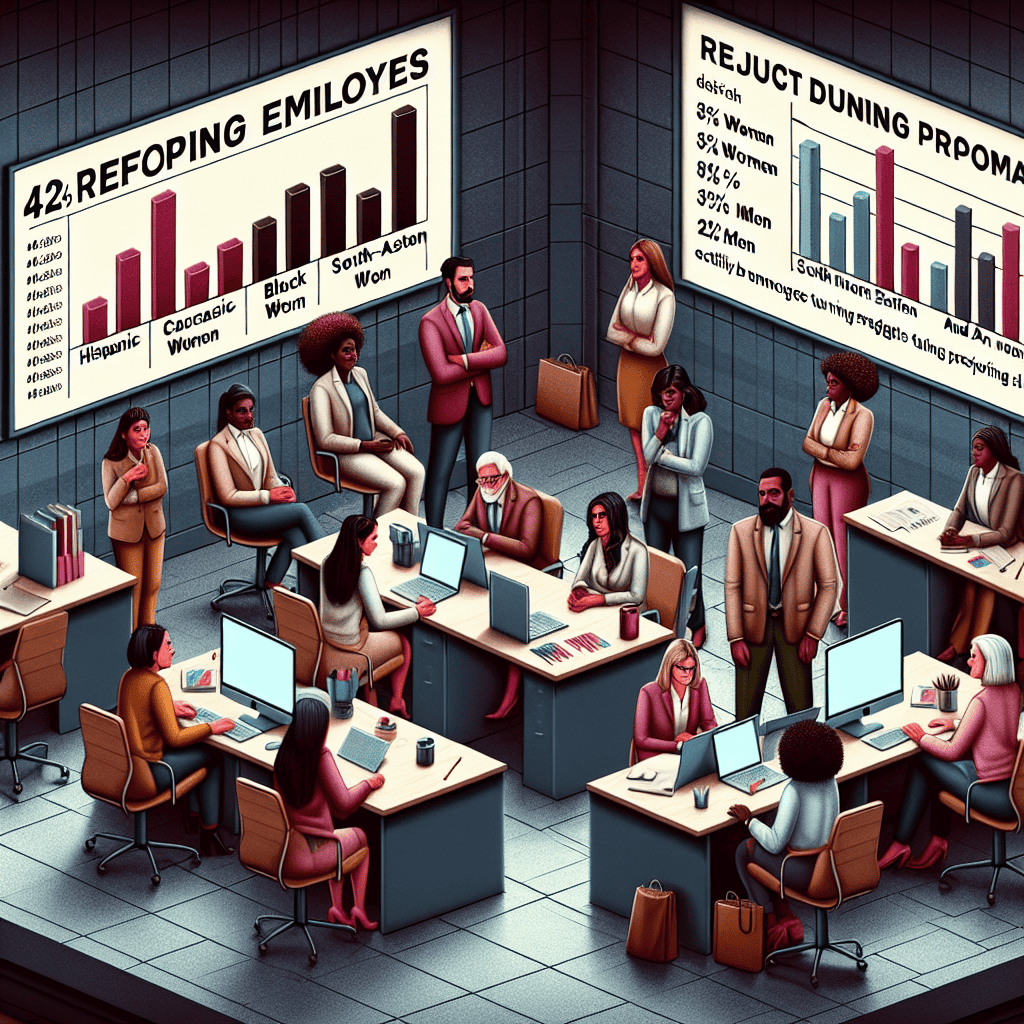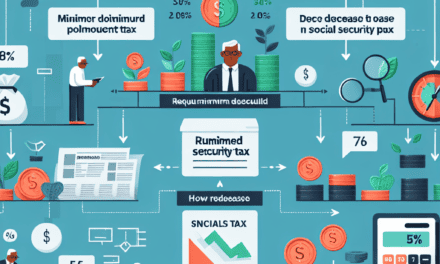“Prioritizing Balance: When Career Growth Means Stepping Back to Move Forward.”
Introduction
In today’s rapidly evolving workplace landscape, a significant shift is occurring as 42% of employees are opting to decline promotions and instead focus on crafting exit strategies. This trend reflects a growing disillusionment with traditional career advancement paths, driven by a multitude of factors including work-life balance concerns, dissatisfaction with corporate culture, and the pursuit of more meaningful and fulfilling work experiences. As organizations grapple with the implications of this shift, understanding the underlying motivations behind employees’ decisions to forgo promotions in favor of exploring new opportunities becomes crucial. This phenomenon not only challenges conventional notions of success but also signals a broader transformation in how individuals prioritize their professional and personal aspirations.
Work-Life Balance: The Hidden Cost of Climbing the Corporate Ladder
In recent years, the corporate landscape has witnessed a surprising trend: a significant portion of employees, approximately 42%, are declining promotions and actively seeking exit strategies. This phenomenon, while initially perplexing, can be largely attributed to the hidden costs associated with climbing the corporate ladder, particularly the impact on work-life balance. As organizations strive to retain talent and foster a productive work environment, understanding the underlying reasons for this trend is crucial.
To begin with, the allure of a promotion traditionally includes increased financial compensation, enhanced status, and greater responsibility. However, these benefits often come with a substantial trade-off: a significant encroachment on personal time and well-being. As employees ascend the corporate hierarchy, they frequently encounter longer working hours, heightened stress levels, and an expectation to be perpetually available. Consequently, the pursuit of career advancement can lead to a diminished quality of life, prompting many to reconsider the true value of a promotion.
Moreover, the modern workforce is increasingly prioritizing work-life balance over traditional markers of success. This shift in values is particularly pronounced among younger generations, such as Millennials and Generation Z, who place a premium on flexibility, personal fulfillment, and mental health. For these individuals, the prospect of a promotion that demands sacrificing personal time and well-being is often unappealing. Instead, they seek roles that offer a harmonious blend of professional and personal life, even if it means forgoing a higher salary or prestigious title.
In addition to changing values, the COVID-19 pandemic has played a pivotal role in reshaping employees’ perspectives on work-life balance. The widespread adoption of remote work during the pandemic provided many with a taste of greater flexibility and autonomy. As a result, employees have become more attuned to the benefits of a balanced lifestyle, leading them to question the necessity of traditional office-based roles that often accompany promotions. This newfound awareness has prompted a reevaluation of career priorities, with many opting to pursue opportunities that align with their desired lifestyle.
Furthermore, the increasing prevalence of burnout in the workplace cannot be overlooked. As employees take on more responsibilities with each promotion, the risk of burnout escalates. The relentless pursuit of professional success can lead to physical and emotional exhaustion, ultimately diminishing job satisfaction and productivity. Recognizing these risks, employees are becoming more discerning about the roles they accept, prioritizing positions that allow them to maintain their well-being and avoid burnout.
In light of these factors, organizations must adapt to the evolving needs and expectations of their workforce. To retain top talent and foster a motivated team, companies should consider implementing policies that promote work-life balance, such as flexible working arrangements, mental health support, and clear boundaries between work and personal time. By doing so, they can create an environment where employees feel valued and empowered to pursue career growth without compromising their well-being.
In conclusion, the decision of 42% of employees to turn down promotions and seek exit strategies is a reflection of the growing importance of work-life balance in today’s corporate world. As values shift and the impact of the pandemic lingers, employees are increasingly prioritizing their well-being over traditional career advancement. For organizations, recognizing and addressing these priorities is essential to retaining talent and ensuring long-term success.
Stagnant Salaries: Why Financial Incentives Aren’t Enough
In recent years, a surprising trend has emerged in the corporate world: a significant portion of employees, approximately 42%, are declining promotions and instead contemplating an exit strategy from their current positions. This phenomenon raises questions about the underlying factors driving such decisions, particularly in an era where career advancement is traditionally seen as a key indicator of professional success. While stagnant salaries are often cited as a primary reason, it is crucial to delve deeper into why financial incentives alone are insufficient to retain talent and motivate employees to climb the corporate ladder.
To begin with, the modern workforce is increasingly valuing work-life balance and personal fulfillment over mere financial gain. Employees are no longer content with the notion of working long hours for a higher paycheck if it means sacrificing their personal lives and well-being. This shift in priorities is particularly evident among younger generations, who prioritize experiences and personal growth over material wealth. Consequently, when promotions come with increased responsibilities and time commitments without a corresponding enhancement in quality of life, they become less appealing.
Moreover, the lack of substantial salary increases accompanying promotions is a significant deterrent. In many organizations, the financial rewards associated with moving up the ranks have not kept pace with the rising cost of living and inflation. As a result, employees may find that the additional income from a promotion does not significantly improve their financial situation. This realization can lead to disillusionment, as the perceived benefits of a promotion do not align with the reality of their financial needs and aspirations.
In addition to financial considerations, the corporate culture and work environment play a pivotal role in employees’ decisions to decline promotions. A toxic or unsupportive work culture can overshadow the allure of a higher position. Employees are increasingly aware of the importance of a positive work environment for their mental health and job satisfaction. If a promotion means entering a more stressful or politically charged environment, many may choose to forgo the opportunity in favor of maintaining their current level of comfort and stability.
Furthermore, the lack of professional development opportunities and meaningful challenges in higher positions can also contribute to employees’ reluctance to accept promotions. When promotions are perceived as lateral moves rather than steps forward in terms of skill enhancement and career growth, they lose their appeal. Employees seek roles that not only offer financial rewards but also provide opportunities for learning, innovation, and personal development. Without these elements, a promotion may seem like a hollow victory.
Lastly, the rise of remote work and the gig economy has expanded employees’ horizons, offering alternative career paths that promise greater flexibility and autonomy. The traditional corporate ladder is no longer the sole route to professional success. Many employees are exploring entrepreneurial ventures, freelance opportunities, or roles in companies that prioritize flexibility and innovation. This shift in career dynamics means that promotions within a single organization are not as enticing as they once were.
In conclusion, while stagnant salaries are a significant factor in employees’ decisions to turn down promotions, they are part of a broader tapestry of considerations. The modern workforce is driven by a complex interplay of financial, personal, and professional factors. To retain talent and encourage upward mobility, organizations must address these multifaceted needs, offering not only competitive salaries but also fostering a supportive culture, providing meaningful challenges, and embracing the evolving landscape of work.
Remote Work Preferences: The Shift Away from Traditional Office Roles
In recent years, the landscape of work has undergone a significant transformation, with remote work emerging as a dominant preference among employees. This shift has led to a surprising trend: a substantial 42% of employees are now turning down promotions and actively seeking exit strategies from traditional office roles. Understanding the reasons behind this phenomenon requires a closer examination of the evolving work environment and the changing priorities of the modern workforce.
The COVID-19 pandemic served as a catalyst for the widespread adoption of remote work, forcing companies to adapt quickly to new ways of operating. As employees experienced the benefits of working from home, many began to reevaluate their career goals and work-life balance. Remote work offers flexibility, reduced commuting time, and the ability to tailor one’s work environment to personal preferences. Consequently, employees have grown accustomed to a level of autonomy that traditional office roles often fail to provide.
Moreover, the shift towards remote work has highlighted the importance of work-life balance, a factor that has become increasingly significant for employees across various industries. The ability to manage personal and professional responsibilities more effectively has led many to prioritize roles that offer this balance. As a result, promotions that require a return to the office or increased time commitments are often viewed as less attractive, prompting employees to decline such opportunities in favor of maintaining their current lifestyle.
In addition to work-life balance, the desire for geographic flexibility has also played a crucial role in this trend. Remote work allows employees to live in locations that suit their personal preferences, whether that means being closer to family, living in a more affordable area, or simply enjoying a different climate. This newfound freedom has made the prospect of returning to a fixed office location less appealing, further contributing to the reluctance to accept traditional promotions.
Furthermore, the digital age has opened up a plethora of opportunities for remote work across various sectors. Employees are no longer limited to local job markets; instead, they can seek positions with companies worldwide. This global access to job opportunities has empowered employees to explore roles that align more closely with their personal and professional aspirations, often leading them to consider exit strategies from their current positions in pursuit of more fulfilling remote opportunities.
Additionally, the evolving nature of work has prompted a reevaluation of what constitutes career success. Traditional markers of success, such as climbing the corporate ladder, are being replaced by a focus on personal fulfillment, skill development, and meaningful work. Employees are increasingly seeking roles that align with their values and passions, even if it means forgoing traditional promotions. This shift in priorities underscores the growing importance of job satisfaction over conventional career advancement.
In conclusion, the preference for remote work has significantly influenced employees’ decisions to turn down promotions and seek exit strategies from traditional office roles. The desire for flexibility, work-life balance, geographic freedom, and personal fulfillment has reshaped the modern workforce’s priorities. As companies continue to adapt to these changing dynamics, understanding and addressing these preferences will be crucial in attracting and retaining top talent in an increasingly competitive job market. The future of work is undoubtedly evolving, and organizations must remain attuned to these shifts to thrive in this new era.
Toxic Work Environments: The Silent Career Killer

In today’s rapidly evolving corporate landscape, the allure of a promotion, traditionally seen as a significant career milestone, is losing its luster for a growing number of employees. Recent studies indicate that 42% of employees are not only turning down promotions but are also actively seeking exit strategies from their current positions. This trend, while surprising to some, can be largely attributed to the pervasive issue of toxic work environments, which have become a silent career killer for many professionals.
To understand this phenomenon, it is essential to first define what constitutes a toxic work environment. Such environments are characterized by poor communication, lack of support, high levels of stress, and often, a culture of blame and fear. These factors contribute to a workplace atmosphere that is detrimental to both mental and physical well-being. Consequently, employees find themselves in a constant state of anxiety and dissatisfaction, which inevitably affects their productivity and overall job satisfaction.
Moreover, the impact of a toxic work environment extends beyond immediate discomfort. It can lead to long-term career stagnation, as employees are often unable to perform at their best or showcase their true potential. This stagnation is further exacerbated when promotions are offered as a mere formality, without addressing the underlying issues that make the workplace unbearable. As a result, employees are increasingly wary of accepting promotions that may come with additional responsibilities but no real change in the work culture.
Furthermore, the modern workforce is becoming more attuned to the importance of work-life balance and mental health. Employees are no longer willing to sacrifice their well-being for the sake of climbing the corporate ladder. This shift in priorities is evident in the growing emphasis on finding roles that offer not only professional growth but also a supportive and healthy work environment. Consequently, when faced with the prospect of a promotion within a toxic setting, many employees opt to seek opportunities elsewhere, where their contributions are valued and their well-being is prioritized.
In addition to personal well-being, the decision to decline promotions and seek exit strategies is also influenced by the desire for meaningful work. Employees today are driven by a sense of purpose and want to feel that their work has a positive impact. In toxic environments, where the focus is often on short-term gains and internal politics, this sense of purpose is frequently lost. As a result, employees are motivated to find organizations that align with their values and offer a more fulfilling career path.
Moreover, the rise of remote work and the gig economy has provided employees with more options than ever before. The ability to work from anywhere and the availability of freelance opportunities have empowered employees to take control of their careers and seek out environments that are conducive to their personal and professional growth. This newfound flexibility has made it easier for employees to leave toxic workplaces and pursue roles that better align with their aspirations.
In conclusion, the decision of 42% of employees to turn down promotions and seek exit strategies is a clear indication of the detrimental impact of toxic work environments. As organizations strive to retain top talent, it is imperative that they address these issues and foster a culture that promotes well-being, purpose, and growth. By doing so, they can not only enhance employee satisfaction but also ensure long-term success in an increasingly competitive market.
Lack of Career Development: When Promotions Don’t Equal Growth
In today’s rapidly evolving job market, a surprising trend has emerged: a significant portion of employees, approximately 42%, are declining promotions and instead seeking exit strategies from their current positions. This phenomenon, while seemingly counterintuitive, can be largely attributed to a lack of genuine career development opportunities within organizations. As companies strive to retain talent, it is crucial to understand why promotions, traditionally seen as a pathway to growth, are no longer sufficient to meet the aspirations of modern employees.
To begin with, the traditional notion of a promotion often implies an increase in responsibilities, a higher salary, and a more prestigious title. However, these superficial changes do not necessarily equate to meaningful career development. Many employees find that promotions merely lead to more work without providing new skills or opportunities for personal growth. Consequently, they perceive these advancements as lateral moves rather than steps forward in their careers. This perception is particularly prevalent among younger workers, who prioritize skill acquisition and personal development over hierarchical progression.
Moreover, the modern workforce is increasingly driven by a desire for purpose and fulfillment in their professional lives. Employees are no longer content with simply climbing the corporate ladder; they seek roles that align with their values and passions. When promotions fail to offer this alignment, employees may feel disconnected from their work, prompting them to explore opportunities elsewhere. This shift in priorities underscores the importance of organizations fostering a culture that emphasizes personal growth and aligns with the values of their workforce.
In addition to these intrinsic factors, external influences also play a significant role in employees’ decisions to decline promotions. The rise of the gig economy and remote work has expanded the range of opportunities available to professionals, allowing them to pursue careers that better suit their lifestyles and aspirations. As a result, employees are more willing to leave traditional employment structures in favor of roles that offer greater flexibility and autonomy. This trend highlights the need for organizations to adapt to the changing landscape by offering more flexible career paths and work arrangements.
Furthermore, the lack of effective mentorship and support within organizations can exacerbate the issue of stagnant career development. Employees who feel unsupported in their professional journeys are less likely to see the value in accepting a promotion. Mentorship programs and continuous learning opportunities are essential in helping employees develop the skills and confidence needed to thrive in new roles. Without these resources, promotions may appear daunting rather than desirable, leading employees to seek growth opportunities elsewhere.
In light of these factors, it is evident that organizations must reevaluate their approach to career development if they wish to retain top talent. By prioritizing meaningful growth opportunities, fostering a supportive work environment, and aligning roles with employees’ values, companies can create a more engaged and motivated workforce. This shift not only benefits employees but also enhances organizational performance by cultivating a culture of innovation and adaptability.
In conclusion, the decision of 42% of employees to turn down promotions and seek exit strategies is a clear indication that traditional career advancement models are no longer sufficient. To address this challenge, organizations must focus on providing genuine career development opportunities that align with the evolving aspirations of their workforce. By doing so, they can ensure that promotions are seen as valuable steps toward personal and professional growth, rather than mere changes in title and responsibility.
Mental Health Awareness: Prioritizing Well-being Over Job Titles
In recent years, a significant shift has been observed in the workforce, with 42% of employees reportedly turning down promotions and instead seeking exit strategies. This trend, which may seem counterintuitive in a traditionally career-driven society, is largely attributed to a growing awareness of mental health and the prioritization of well-being over job titles. As organizations grapple with this new reality, it is essential to understand the underlying factors contributing to this phenomenon.
To begin with, the modern workplace has become increasingly demanding, often requiring employees to juggle multiple responsibilities and work extended hours. While promotions typically come with increased pay and prestige, they also bring additional stress and pressure. Many employees are finding that the trade-off between higher status and personal well-being is not worth the cost. This realization is prompting a reevaluation of what constitutes success, with a growing number of individuals prioritizing mental health and work-life balance over climbing the corporate ladder.
Moreover, the COVID-19 pandemic has played a pivotal role in reshaping attitudes towards work and mental health. The global crisis forced many to confront their own vulnerabilities and reconsider their priorities. Remote work became the norm, blurring the lines between professional and personal life, and leading to increased burnout and stress. As a result, employees have become more attuned to the importance of mental health, recognizing that a fulfilling life extends beyond professional achievements. This shift in perspective has led many to question whether the pursuit of higher job titles is worth sacrificing their mental well-being.
In addition to these personal considerations, there is also a growing awareness of the systemic issues within organizations that contribute to poor mental health. Toxic work environments, lack of support, and unrealistic expectations are just a few of the factors that can lead to employee dissatisfaction and burnout. As employees become more vocal about these issues, they are also more willing to walk away from opportunities that do not align with their values or support their well-being. This newfound empowerment is driving a cultural shift in which individuals are no longer willing to compromise their mental health for the sake of career advancement.
Furthermore, the rise of the gig economy and the increasing availability of remote work opportunities have provided employees with more options than ever before. This flexibility allows individuals to design their careers in a way that aligns with their personal values and lifestyle preferences. As a result, traditional career paths are being redefined, with many opting for roles that offer greater autonomy and work-life balance, even if it means forgoing a promotion.
In conclusion, the decision of 42% of employees to turn down promotions and seek exit strategies is a reflection of a broader societal shift towards prioritizing mental health and well-being. As awareness of these issues continues to grow, it is likely that more individuals will choose to prioritize their personal fulfillment over traditional markers of success. For organizations, this trend presents both a challenge and an opportunity. By fostering a supportive work environment and promoting mental health awareness, companies can not only retain talent but also contribute to a healthier, more engaged workforce. As the conversation around mental health continues to evolve, it is clear that well-being will remain a central consideration in the future of work.
The Rise of Gig Economy: Flexibility Over Stability in Career Choices
In recent years, the traditional career ladder has been increasingly challenged by the rise of the gig economy, a shift that has seen a significant number of employees turning down promotions in favor of more flexible work arrangements. According to recent studies, approximately 42% of employees are opting out of conventional career advancement opportunities, instead seeking exit strategies that align with their personal and professional aspirations. This trend underscores a growing preference for flexibility over stability, as workers prioritize work-life balance, autonomy, and diverse experiences over the conventional markers of success.
The gig economy, characterized by short-term contracts and freelance work, offers a level of flexibility that traditional employment often cannot match. This flexibility allows individuals to tailor their work schedules to fit their personal lives, a benefit that is particularly appealing in an era where work-life balance is increasingly valued. For many, the ability to choose when and where they work is more attractive than the predictability and security of a full-time position. This shift in priorities is evident in the growing number of professionals who are willing to forgo the financial and status benefits of a promotion in exchange for the freedom to manage their own time and projects.
Moreover, the gig economy provides opportunities for individuals to diversify their skill sets and experiences. Unlike traditional roles that may confine employees to specific tasks or industries, gig work allows for exploration across various fields and disciplines. This variety not only keeps work engaging but also enhances an individual’s adaptability and marketability in an ever-changing job market. As a result, many workers are choosing to leave the confines of a single employer to pursue a portfolio career, where they can leverage their skills across multiple projects and clients.
In addition to flexibility and diversity, the gig economy also offers a sense of autonomy that is often lacking in traditional employment. Gig workers have the ability to choose the projects they work on, the clients they collaborate with, and the terms of their engagement. This level of control is empowering, allowing individuals to align their work with their personal values and interests. For many, this autonomy is a key factor in their decision to reject promotions that would tie them to a single employer and a predetermined career path.
However, it is important to acknowledge the challenges that come with gig work. The lack of job security, benefits, and a steady income can be significant drawbacks for some individuals. Despite these challenges, the appeal of flexibility and autonomy continues to draw many workers away from traditional employment. Companies are beginning to recognize this shift and are adapting by offering more flexible work arrangements and opportunities for remote work in an effort to retain talent.
In conclusion, the rise of the gig economy reflects a broader transformation in career choices, where flexibility and autonomy are increasingly prioritized over stability and traditional career advancement. As more employees turn down promotions and seek exit strategies, it is clear that the conventional career ladder is being redefined. This shift presents both opportunities and challenges for workers and employers alike, as they navigate a new landscape where the lines between work and life are increasingly blurred. As the gig economy continues to grow, it will be crucial for organizations to adapt and innovate in order to meet the evolving needs and expectations of the modern workforce.
Q&A
1. **Question:** What is a primary reason employees are turning down promotions?
**Answer:** Many employees are turning down promotions due to increased responsibilities without a corresponding increase in compensation or work-life balance.
2. **Question:** How does work-life balance influence employees’ decisions regarding promotions?
**Answer:** Employees prioritize work-life balance and may decline promotions if they perceive that the new role will negatively impact their personal time and well-being.
3. **Question:** What role does company culture play in employees seeking exit strategies?
**Answer:** A toxic or unsupportive company culture can drive employees to seek exit strategies, as they look for environments that align better with their values and offer a more positive atmosphere.
4. **Question:** How does job satisfaction affect employees’ willingness to accept promotions?
**Answer:** Low job satisfaction can lead employees to decline promotions, as they may not see the value in advancing within a company where they are unhappy.
5. **Question:** Why might employees feel undervalued when offered a promotion?
**Answer:** Employees might feel undervalued if the promotion does not come with adequate recognition, such as a significant pay raise or acknowledgment of their contributions.
6. **Question:** What impact does career development have on employees’ decisions to leave a company?
**Answer:** Lack of career development opportunities can prompt employees to leave, as they seek organizations that offer better growth prospects and skill enhancement.
7. **Question:** How does the current job market influence employees’ decisions to turn down promotions?
**Answer:** A strong job market with plentiful opportunities can embolden employees to turn down promotions, as they feel confident in their ability to find better positions elsewhere.
Conclusion
The trend of 42% of employees turning down promotions and seeking exit strategies can be attributed to several key factors. Firstly, many employees are prioritizing work-life balance and mental health over career advancement, recognizing that promotions often come with increased responsibilities and stress without proportional compensation. Secondly, there is a growing disillusionment with traditional corporate structures, where employees feel undervalued and see limited opportunities for meaningful growth or impact. Additionally, the rise of remote work and the gig economy has provided more flexible and diverse career options, encouraging employees to explore opportunities that align better with their personal values and lifestyle preferences. Lastly, the COVID-19 pandemic has prompted a reevaluation of life priorities, leading many to seek roles that offer greater fulfillment and alignment with their long-term goals. These factors collectively contribute to the increasing trend of employees declining promotions in favor of pursuing alternative career paths.





